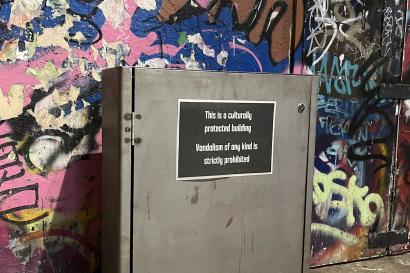
I came to Berlin, Germany with zero German skills. My knowledge consisted of whatever Duolingo decided was important, which turned out to be asking “wo ist die Maus?” (I never had to ask that question, mostly because I was well aware of any mouse I came across). I wish I took the time to learn a bit more German before I left because my experience was definitely impacted by my language skills (or lack thereof).
Berlin is an international city, so at any given time you can hear three, four, or even five different languages being spoken around you. Most service workers know English (and their English may even be better than a native speaker’s), so I did not technically have any issues of communication, but I still felt somewhat disconnected from the city. Back home, I am used to the culture of southern hospitality and talking with servers and cashiers, but in Berlin that experience was much different. Overall, Germans do not typically engage in small talk and most exchanges are quick and efficient, but I still wish I could have a conversation in German past the basic “how are you?”
I found myself being quieter than normal in grocery stores and other social contexts because I harbored the shame of being an American in a foreign country that could not speak the language. I wanted to fully engage in the culture and show respect by speaking and understanding German, but I often felt annoying. I would constantly apologize for not knowing German, even though the IES Abroad program welcomes beginning German learners. In an effort to improve my German, I took an introduction to German course, but I still did not feel confident in my language abilities. IES Abroad consists mostly of American students, so there was not any interaction with German students, so immersion was not completely possible. Some students in the program were fluent, so I tried to learn from them, but I would fall behind in the conversations, once again causing me to be quieter.
For me, having a better grasp on the language would have heightened my experience. The few times I was able to communicate with locals or order a drink in German, I felt more connected to the city. If that is a feeling you are hoping to achieve, then I recommend coming to the country with a solid foundation in the language. I don’t think it is possible to become fluent in German through this program, even with a solid prior knowledge of the language. I naively thought that a three months in a foreign country would significantly improve my language skills, but, at least for me, that was not realistic.
Language barriers should be a consideration for anyone studying abroad. Even in Berlin, where majority of people speak English, I still felt disconnected due to my inability to speak the German. For me, not knowing German made me lose my voice, even in English.

Kassidy Witt
Hallo! My name is Kassidy Witt, and I am a senior political science major at Trinity University in San Antonio, TX. I moved around the United States a lot growing up, yet my travel bug is still not content. I love adventure and I am a huge history nerd, so I am beyond excited to study in Berlin this fall!







